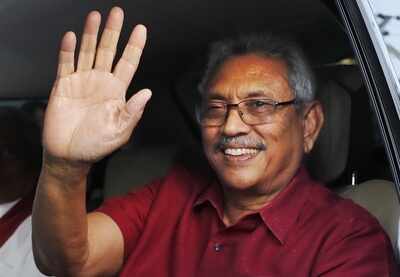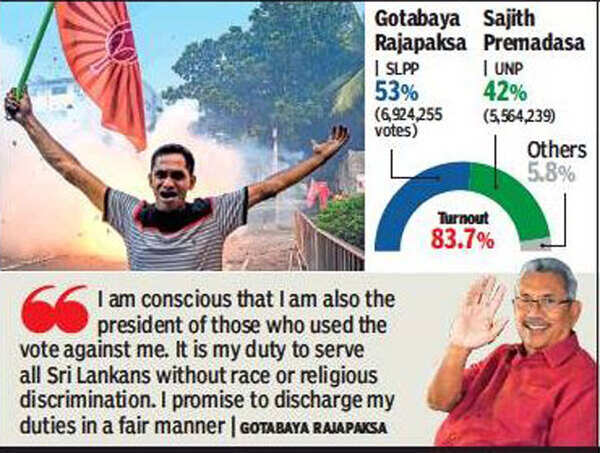- News
- World News
- South Asia News
- PM Modi congratulates new Sri Lanka prez Gotabaya but concerns remain over Rajapaksas' China links
Trending
This story is from November 18, 2019
PM Modi congratulates new Sri Lanka prez Gotabaya but concerns remain over Rajapaksas' China links
Behind PM Modi's tweet congratulating Gotabaya Rajapaksa on being elected Sri Lanka's new president and Rajapaksa accepting Modi's invite to visit India lies serious concerns. Strategic affairs expert Brahma Chellaney said with a pro-China communist govt in Nepal, an implacably hostile Pakistan and Rajapaksa's win, India faces daunting regional challenges.

Key Highlights
- While there’s still the feeling that Sri Lanka, given its geography and economic dependence, cannot turn its back on India, it’s a fact that the Rajapaksas’ return to power is good news for Beijing
- Sri Lanka was among the countries where China’s so called debt trap diplomacy played out first and many believe this was mostly because of Mahinda, Gotabaya'solder brother
PM Narendra Modi was among the first to congratulate Sri Lanka’s controversial military strongman and leader Gotabaya Rajapaksa after he emerged victorious in the presidential polls defeating his nearest rival Sajith Premadasa, who was considered favourably inclined towards India, by over 13 lakh votes.
Modi said on Twitter he looked forward to working closely with Gotabaya, brother of former president Mahinda Rajapaksa, for deepening the "close and fraternal ties between our two countries and citizens, and for peace, prosperity as well as security in our region".
Gotabaya, who secured over 52 percent of votes, thanked Modi and Indian people in response , as he said that the 2 nations were bound by history and common beliefs and that he looked forward to working together on development and security. Gotabaya also accepted Modi's invite to visit India. This show of goodwill though masked serious concerns here about Gotabaya who is seen as a pro-China leader, not least because of his brother Mahinda's China-centric economic and security policies when he was the president.

Sri Lanka was among the countries where China’s so called debt trap diplomacy played out first and many believe this was mostly because of Mahinda whose election as president in 2005 coincided with China’s growing role then in Sri Lanka’s infrastructure sector. Beijing’s ``no-strings overseas aid and loans’’ to Mahinda saw China replacing Japan in no time as the largest donor to the island nation.
While the majority group, Sinhalese, voted overwhelmingly in favour of Gotabaya, he remains a despised figure among the minorities like Tamils and Muslims. The former defence secretary is credited with having ended the civil war in the country by brutalizing and eliminating Tamil separatists.
As strategic affairs expert Brahma Chellaney says, with a pro-China communist government in Nepal, an implacably hostile Pakistan and the Rajapaksa family back in power in Sri Lanka, India faces daunting regional challenges.
``The pro-China Gotabaya’s ascendancy to power in Sri Lanka more than counterbalances the earlier ouster in the Maldives of a Beijing-backed autocrat, Yameen. Sri Lanka straddles vital sea lanes and is central to India’s maritime security,’’ says Chellaney.
While there’s still the feeling that Sri Lanka, given its geography and economic dependence, cannot turn its back on India, it’s a fact that the Rajapaksas’ return to power is good news for Beijing. ``This development could further erode India’s once-dominant influence in Sri Lanka,’’ adds Chellaney.
To be sure, India wasn't entirely unprepared for this. The government had been sending feelers to the Rajapaksas for over a year to dispel the notion that it was hostile to them. These efforts led to Modi hosting Mahinda here in September last year and again meeting him during his visit to Sri Lanka in June this year. On both occasions, the 2 discussed at length issues like counter-terrorism, economic development and security in the region.
Before that though, in an interview to an Indian publication in early 2018, Gotabaya was quoted as having said the Modi government looked at Sri Lanka in a different way (from the earlier Congress government) and accused it of raising issues without having proper understanding of those. He had also said that Sri Lankans felt there was ``unnecessary influence’’ by Indian government in internal affairs of his country and this was also seen in the elections in which Mahinda was ousted. He had then said that even the Indian mission in Colombo was reluctant to meet the Rajapaksas.
Gotabaya's victory also opens the door for Mahinda himself to take over as the prime minister. President Sirisena last year sought to appoint him PM after sacking Ranil Wickremesinghe, and later tried to dissolve Parliament after Mahinda failed to garner majority, but these attempts were thwarted by the Supreme Court.
Modi said on Twitter he looked forward to working closely with Gotabaya, brother of former president Mahinda Rajapaksa, for deepening the "close and fraternal ties between our two countries and citizens, and for peace, prosperity as well as security in our region".
Gotabaya, who secured over 52 percent of votes, thanked Modi and Indian people in response , as he said that the 2 nations were bound by history and common beliefs and that he looked forward to working together on development and security. Gotabaya also accepted Modi's invite to visit India. This show of goodwill though masked serious concerns here about Gotabaya who is seen as a pro-China leader, not least because of his brother Mahinda's China-centric economic and security policies when he was the president.

Sri Lanka was among the countries where China’s so called debt trap diplomacy played out first and many believe this was mostly because of Mahinda whose election as president in 2005 coincided with China’s growing role then in Sri Lanka’s infrastructure sector. Beijing’s ``no-strings overseas aid and loans’’ to Mahinda saw China replacing Japan in no time as the largest donor to the island nation.
While the majority group, Sinhalese, voted overwhelmingly in favour of Gotabaya, he remains a despised figure among the minorities like Tamils and Muslims. The former defence secretary is credited with having ended the civil war in the country by brutalizing and eliminating Tamil separatists.
As strategic affairs expert Brahma Chellaney says, with a pro-China communist government in Nepal, an implacably hostile Pakistan and the Rajapaksa family back in power in Sri Lanka, India faces daunting regional challenges.
``The pro-China Gotabaya’s ascendancy to power in Sri Lanka more than counterbalances the earlier ouster in the Maldives of a Beijing-backed autocrat, Yameen. Sri Lanka straddles vital sea lanes and is central to India’s maritime security,’’ says Chellaney.
While there’s still the feeling that Sri Lanka, given its geography and economic dependence, cannot turn its back on India, it’s a fact that the Rajapaksas’ return to power is good news for Beijing. ``This development could further erode India’s once-dominant influence in Sri Lanka,’’ adds Chellaney.
To be sure, India wasn't entirely unprepared for this. The government had been sending feelers to the Rajapaksas for over a year to dispel the notion that it was hostile to them. These efforts led to Modi hosting Mahinda here in September last year and again meeting him during his visit to Sri Lanka in June this year. On both occasions, the 2 discussed at length issues like counter-terrorism, economic development and security in the region.
Before that though, in an interview to an Indian publication in early 2018, Gotabaya was quoted as having said the Modi government looked at Sri Lanka in a different way (from the earlier Congress government) and accused it of raising issues without having proper understanding of those. He had also said that Sri Lankans felt there was ``unnecessary influence’’ by Indian government in internal affairs of his country and this was also seen in the elections in which Mahinda was ousted. He had then said that even the Indian mission in Colombo was reluctant to meet the Rajapaksas.
Gotabaya's victory also opens the door for Mahinda himself to take over as the prime minister. President Sirisena last year sought to appoint him PM after sacking Ranil Wickremesinghe, and later tried to dissolve Parliament after Mahinda failed to garner majority, but these attempts were thwarted by the Supreme Court.
End of Article
FOLLOW US ON SOCIAL MEDIA










